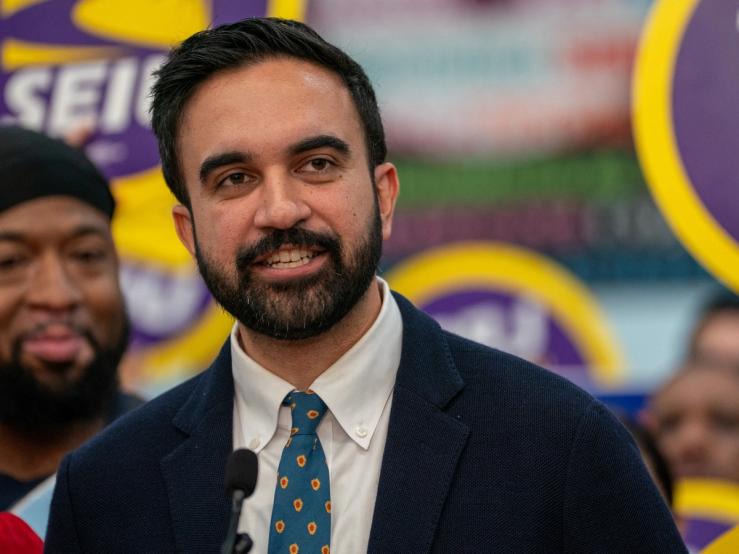The Scoop
The afternoon before a long holiday weekend isn’t always the best time to drop a major scoop. But the New York Times did not want to wait to publish its story about Zohran Mamdani’s application to Columbia University in 2009, in which the paper reported that the Democratic nominee for New York City mayor then identified his race on a form as both “Asian” and “Black or African American.” Mamdani is of South Asian ethnicity and was born in Uganda.
The story, published late last week, came as the result of the release of hacked Columbia University records that were then shared with the Times. The paper believed it had reason to push the story out quickly: It did not want to be scooped by the independent journalist Christopher Rufo. Two people familiar with the reporting process told Semafor that the paper was aware that other journalists were working on the admissions story, including Rufo, a conservative best known for his crusade against critical race theory.
In a message, Rufo confirmed to Semafor that he had been reporting out the piece before the Times published its version of the story. Rufo said that he would be publishing additional details about the incident on his Substack in the coming days.
A spokesperson for the paper declined to comment on whether Rufo’s reporting prompted the paper to push the piece out on Thursday, and pointed Semafor to a statement it first provided to the Columbia Journalism Review outlining its reason for publishing the piece.
“What matters most here is whether the information was true and factual — it was, confirmed by Mr. Mamdani; that it was independently confirmed; and that it is relevant to the public,” said Patrick Healy, assistant managing editor for standards and trust at the Times.
In this article:
Know More
Over the weekend, the Times’ story has been the subject of heated debate and intense external criticism from Mamdani supporters and some media critics.
Some critics defended Mamdani’s decision to identify on the admissions form as African American, noting that he was born in Africa. Others questioned why the Times would publish an entire piece based on leaked details of a teenager’s rejected college application. But much of the criticism focused on one of the paper’s sources, an pseudonymous academic on Twitter whose views on affirmative action and race and IQ have faced intense criticism.
The piece also seemed to divide staff, and reignited years-old internal tensions between some younger, more left-leaning members of staff and management.
“People are really upset,” one Times journalist told Semafor.
In a series of posts on Bluesky, Times columnist Jamelle Bouie said, “i think you should tell readers if your source is a nazi.” On Friday, he deleted his posts, saying they violated the Times’ social media guidelines. Bouie also deleted subsequent posts on Sunday that also seemed to express frustration at the Times’ decision to publish the story, and shared a post that said “NYT & many of its elite white readers are still obsessed with race-conscious college admissions.”
The paper would not comment on whether it had compelled Bouie to delete the posts.
Times columnist Lydia Polgreen did not comment on whether the story was newsworthy, but wrote that as a biracial person with African parents, she easily understood why Mamdani checked a box on his college admissions form identifying as Black or African American.
“I can see why a political young man like Zohran might fill out his college application the way he did,” she wrote on Twitter. “Because if you are like me, you struggle to be known in this country. Our visual sorting is so simplistic and quite brutal.”
Despite some public criticism and internal grumbling, the paper’s leadership has continued to back the piece.
One person familiar with the editorial process noted that the Times’ senior editors were aligned on whether to publish the piece, which was read and greenlit by multiple top editors before its publication. Others on staff that spoke with Semafor on the condition of anonymity said the reaction to the piece showed why it was important to tackle it.
“The fact that this story engendered all the conversation and debate that it has feels like all the evidence you need that this was a legit line of reporting,” one senior reporter told Semafor.
Max’s view
The Times story on Mamdani touches on a lot of the trickiest issues many newsrooms face today: whether and how to report on hacked documents, whether scoop-chasing can blow up relatively inconsequential stories, and how to write about many modern Americans’ complex racial identities.
I did not find the admissions story to be particularly compelling (I’m mixed race and have on occasion found these kinds of forms to be somewhat reductive), though as a journalist who covers media inside baseball, I’ve often been on the receiving end of questions about the newsworthiness of my work. Clearly some people were interested in the story, even if others found it to be a complete nothingburger.
The more interesting question revolves around Mamdani’s relationship with the Times, and how the Democratic nominee will treat the hometown paper of record if he is elected mayor in the fall.
In recent years, many prominent Democratic figures have been frustrated by the Times, taking issue with the editorial sensibilities of a paper that many of their supporters consume religiously.
Former President Joe Biden and his White House communications team was often furious at the Times, believing that the paper did not effectively communicate what it saw as his political and policy victories to voters. Former Secretary of State Hillary Clinton’s campaign grumbled about the paper’s coverage of her use of a private email account for years after she ran in 2016, while Rep. Alexandria Ocasio-Cortez in 2019 complained that the Times’ coverage of her was “dripping with condescension.”
As Semafor reported last week, Mamdani has been flooded with inquiries and requests since his surprise primary victory last month. His campaign plans to meet with top editors and producers in the coming weeks as part of an informal general election reset, aimed at clearing up lines of communication and explaining where it feels the news media has misunderstood Mamdani.
Among those that will surely be at the top of the list is the Times. The paper’s editorial board took the unusual step of not picking a candidate in the mayoral primary, but it did recommend against supporting Mamdani, citing his lack of experience and skepticism of his policy proposals.
It remains to be seen whether the Mamdani campaign, which has touted its mantra of speaking to anyone, will alter the way it approaches the Times in the wake of this story. The campaign had recently been in talks for him to appear on the paper’s flagship podcast, The Daily.
Notable
- Kelly McBride, senior vice president at Poynter, told Columbia Journalism Review that she could see why the Times ran the Mamdani story, “but the information about the hack is pretty far down in the story, and I think it’s deeply relevant.”
- The Times ran a profile of Mamdani’s parents, filmmaker Mira Nair and Columbia anthropology professor Mahmood Mamdani, late last month.
- “These are the opinions of about a dozen New Yorkers and a democracy will be decided by close to a million New Yorkers,” Mamdani said of the Times editorial board’s snub, before his shock primary win.



